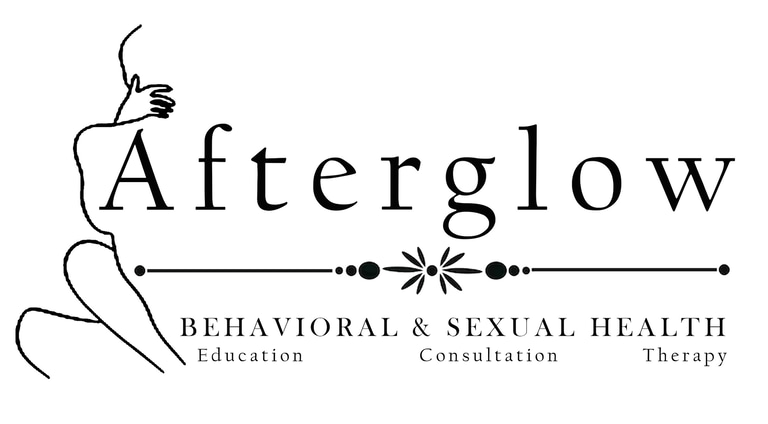Sexual Health for Amputees
At Afterglow Behavioral and Sexual Health, we understand that life after amputation involves more than physical healing. The journey also touches your identity, self-image, and your experience of intimacy. While medical teams often focus on function and recovery, the emotional and sexual impact of amputation is rarely addressed—leaving many people wondering:
Can I still be sexual? Desirable? Connected? Whole?
The answer is yes. And at Afterglow, we’re here to walk with you on that journey.






When the Body Changes, So Does the Relationship With It
Amputation significantly reshapes a person’s relationship with their body, often disrupting their sense of identity, confidence, and sexual self-image. Studies show that changes in physical form following amputation can lead to complex emotional responses including grief, body dissatisfaction, and reduced sexual self-esteem. A 2020 study in Disability and Rehabilitation found that over 60% of individuals with limb loss reported negative changes in body image, which directly correlated with a decrease in sexual desire and confidence. This impact is not simply physical—it’s psychological, relational, and deeply tied to cultural perceptions of “wholeness” and desirability. Many amputees internalize societal discomfort with disability, leading to avoidance of sexual intimacy, reluctance to initiate touch, and anxiety about being seen unclothed. These reactions can become barriers to sexual wellness if left unaddressed.
Yet, despite these challenges, evidence suggests that with holistic, affirming care, individuals living with amputation can rebuild satisfying, confident sexual lives. A 2021 study published in Sexuality and Disability found that when sexual health was addressed in rehabilitation, individuals were twice as likely to report positive sexual adjustment and higher overall relationship satisfaction. Body reconnection practices, adaptive sexual techniques, and open partner communication were all linked to improved outcomes. At Afterglow Behavioral and Sexual Health, we recognize that healing after amputation is not just about physical recovery—it’s about reclaiming agency, touch, and intimacy in a changed body. Our care honors the emotional, sensory, and sexual dimensions of post-amputation life, guiding individuals through grief, adjustment, and into renewed confidence and pleasure.Whether your amputation was recent or many years ago, planned or sudden, trauma-related or medically necessary, it can disrupt how you see yourself and how you relate to others sexually. You may experience:
Grief and confusion over a changed body
Fear or anxiety about being seen naked or touched intimately
Changes in arousal, orgasm, or physical sexual function
Challenges in finding comfortable or accessible sexual positions
Difficulty trusting that your partner still desires you—or ever could
A feeling that your body is “unfinished,” “awkward,” or “not yours”
At Afterglow, we don’t believe sexuality ends with amputation. We believe it adapts, expands, and transforms—just like you have.
You Are Still Whole. You Are Still Worthy. You Are Still Sexual.
Amputation can alter how individuals see themselves, but it does not take away their wholeness, worth, or sexual identity. The emotional and psychological impact of limb loss often includes grief, altered self-perception, and fear of rejection. However, research consistently shows that body image and sexual confidence are shaped more by internal beliefs and relational support than physical form. A 2019 study in Sexuality and Disability found that individuals with limb loss who felt emotionally supported and received affirming care were 70% more likely to maintain or regain a positive sexual identity. This reinforces the idea that sexuality is not confined to able-bodied norms—it is a deeply human experience of connection, sensation, and self-worth that remains fully accessible to amputees.
Many amputees report feeling invisible in conversations about sex and intimacy, yet their needs and desires are just as valid and vital. A 2021 article in the Journal of Rehabilitation Research and Development noted that nearly 80% of veterans with amputations expressed a desire for more open, supportive dialogue about sex during medical or therapeutic care, but found such topics were rarely addressed. At Afterglow, we approach post-amputation sexual health with the unshakable belief that all bodies—changed, healing, or redefined—are still whole and worthy of pleasure. Through adaptive sexual strategies, emotional healing, and body-affirming practices, we help amputees reclaim intimacy on their own terms. Your body is not broken—it is resilient, sensual, and deserving of joy.
We know how often people with amputations are desexualized, misunderstood, or pitied. At Afterglow, we reject that narrative. We believe:
You deserve to feel desired and deserving of desire.
You have the right to explore pleasure on your terms.
You are allowed to grieve what was while embracing what is.
You are not broken. You are becoming.
Your sexual identity didn’t end when your body changed. It’s evolving. And that evolution can be beautiful, powerful, and deeply healing.
A Different Kind of Recovery: Sexual Healing and Identity
Amputation often leads to a profound reevaluation of self-image, including one's sense of sexual identity. For many, the loss of a limb disrupts previously held beliefs about attractiveness, desirability, and the ability to experience or offer pleasure. A 2020 study in The Journal of Sex Research reported that 62% of individuals with amputations experienced a decline in sexual self-concept, with many attributing this to altered body image and feelings of disconnection from their changed form. Yet the same study found that when individuals were provided with comprehensive rehabilitation—including counseling focused on intimacy and sexual health—over half regained confidence in their sexual identity within 12 months. This underscores the importance of not only physical but emotional and sexual healing in recovery.
Sexual healing for amputees is not just about adapting technique; it’s about reclaiming agency, rediscovering pleasure, and redefining what intimacy means in a newly experienced body. A 2022 survey in Sexuality and Disability found that amputees who received affirming, inclusive care reported a 43% increase in sexual satisfaction and a 38% increase in relationship confidence, especially when care providers acknowledged their full personhood beyond the medical lens. At Afterglow Behavioral and Sexual Health, we honor the truth that sexual identity doesn't end with limb loss—it evolves. Our care model empowers amputees to reconnect with themselves and others through body-affirming practices, adaptive intimacy tools, and emotionally grounded strategies that support the integration of sexuality as a vital, resilient part of healing.
Our founder, Dr. Kent, a disabled veteran and clinician, created Afterglow to be a space where people navigating body changes could heal emotionally and sexually—not just physically. We provide specialized, trauma-informed support for those living with limb loss to help you:
Rebuild sexual confidence and connection with your body
Address body image and self-worth in the context of intimacy
Explore accessible, affirming touch and sexual expression
Process feelings of grief, disconnection, or shame
Learn new ways to communicate desires and needs to partners
Reclaim your identity as a sexual being, in a body that may feel new or unfamiliar
We honor your body—not because it looks or works a certain way, but because it belongs to you.
Adaptive, Empowering, and Partner-Inclusive Support
Adaptive and empowering support is essential to helping amputees rebuild confidence and connection in their sexual lives. Traditional rehabilitation too often overlooks sexual health, despite research showing its critical role in overall well-being. A 2021 study in Sexuality and Disability found that when sexual health was addressed during post-amputation care, individuals were twice as likely to report satisfaction with their sexual lives and demonstrated improved body image and communication with partners. Adaptive strategies—such as experimenting with different positions, using supportive devices or cushions, and focusing on non-penetrative pleasure—help restore agency and expand what intimacy can look like. At Afterglow Behavioral and Sexual Health, we believe adaptive care doesn’t mean compromising—it means creating new pathways to sensuality, confidence, and connection.
Partner-inclusive approaches are equally vital. Research published in the Journal of Rehabilitation Research & Development (2019) revealed that 68% of amputees in relationships reported increased intimacy and reduced sexual anxiety when partners were involved in conversations about body image and sexual adjustment. Including partners in education, therapy, and exploration not only reduces stigma and fear but also strengthens emotional and physical intimacy. Many couples find that learning together enhances trust, encourages creativity, and leads to deeper satisfaction in their sexual connection. At Afterglow, we offer partner-inclusive care that affirms both the individual and the relationship, helping couples build a foundation where vulnerability becomes a strength and touch becomes a powerful form of mutual healing.
Your body may move, feel, or look different—but your capacity for connection, pleasure, and desire is still very real. At Afterglow, we work with individuals and couples to discover what intimacy looks like now, in ways that are physically comfortable, emotionally safe, and sexually satisfying.
We help you and your partner(s):
Reimagine intimacy beyond what it used to be
Explore adaptive sexual positions, tools, and support strategies
Create rituals of connection that honor both body and bond
Heal together if amputation was related to trauma, illness, or injury
Break down the myths that say desire has to be limited by disability
There is no one “right” way to be intimate after amputation—only ways that work for you.

Get More Informatin or Schedule Today
Connect with us
© 2025. All rights reserved.
dr.kent.sexhealth@gmail.com


